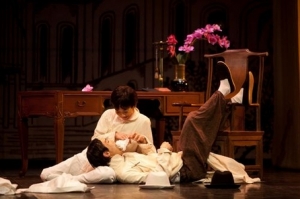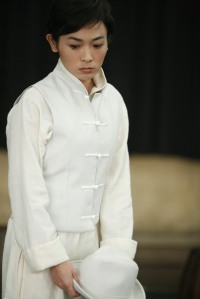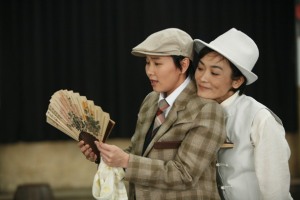HE IS MY WIFE HE IS MY MOTHER

By Katherine H. Chou
Inspired from Li Yu’s Silent Opera
Performed in Chinese with English subtitles
29-31th JULY 2010 at 19:30
Except Sunday at 14:30 and 19:30
At the Metropolitan Hall – Taipei – TAIWAN
Tickets: 500,600,800,1000,1500,2000 NT

This contemporary creation inspired by an ancient text relates the Chinese Nanfeng Fashion in two different times and places.
What’s the Nanfeng Fashion (南風) ?
It was a custom in fashion from Fujian, an area in South-Eastern China in front of Taiwan, where a lot of Taiwanese are originally from. The word Nanfeng (which means wind from south) indicates the homosexual inclination of the Fujian’s inhabitants. Homosexual unions were by the way allowed at these times. In the city of Putian, where a part of the story takes place, Mazu -the Goddess of the Sea- was born. The city became a pilgrimage place for Taiwanese people and believers of Mazu.
So what is this creation telling us?
In a nutshell, it’s about the eternal love between Xu Jifang, a young widower, who is a very cultivated landlord recently returned from China, and You Ruilang, a young poor boy with an incredible beauty. In 1912, they met each other in Putian during Mazu’s celebration, which was exclusively reserved for men. For his old friend Chen Dalong’s despair, Jifang ruined himself in order to marry the young You, who emasculates himself to prove his love and his devotion to his husband and also that he will never leave him for a woman. From jealousy Chen Dalong condemned You to being beat with sticks but, by love, Jifang will take his place and die asking You to “take care of his young son”.
The second part of the story takes place in 1959, during this period in which homosexuality was severely repressed. Ruilang changes his name for Ruinang and migrates to Taiwan. He became a woman and lives, with his cousin who travels all year for business. Ruinang brings up as a mother Jifang’s son, prohibiting him to see other boys to spare him sufferings You knew. Unfortunately the relationship between the young boy Chengxian and Chen Nianzu, who is being discovered to be Dalong’s nephew, is close to the Nanfeng Fashion for Ruinang’s distress. He will be the one to receive the prize of the best mother…
The Art Direction…
Using double-scenography, the director shows the two periods “time-space” of the story, with magnificent drapes or interior scenery, Katherine the director and author of the show, imagined a special representation: in the first part, Lee -the artist who interprets Dalong and his nephew- plays “Nanguan”, and we discover with a lot of sensitivity a homosexual love tending to universality, subtly directed – we have to admit the intelligent choice to give You’s role to a androgynous woman and Jifang’s to a masculine features actor – with love scenes and complicity of a surprising beauty. The aesthetic of this first part is inspired from the traditional and very symbolic gestures, but with a pinch of contemporaneity.
The second part’s direction is more realistic, less aesthetic, but nevertheless a suppleness and a beauty rise from the moves of the actors, inherited from the artistic tradition. Lightness is also there thanks to the cousin, a funny interpreted by Wu Wei Wei, contrasting with the “straighter” interpretation of the conscientious mother by Hsu Yen ling.

All the actors are of a high degree: Yen ling is remarkable for her You’s interpretation – by her walk and also by her voice – excels at playing the joyful mother. Wei Wei is so amusing in his tomboy role: her joy is communicative. Hsu Hua-chien is excellent as a numb in cold lover and a son repressing his homosexuality. Lee Yi-Hsiu, who’s got a beautiful voice, plays admirably. And the others actors are as well.
“He is my wife, he is my mother” is on tour and we highly recommend it to you, because beyond the question of homosexuality more or less well accepted in Taipei nowadays, this creation in “two times-two spaces” raises interrogations about China’s history, its past, its conflicts, its present, its contradictions, with acuity and smartness, without seeming to approach it. Because at the end of the show, which we will not reveal, leaves us with a question which will still be powerful when we are out of the politically correct and the lobbies.
Diane VANDERMOLINA


